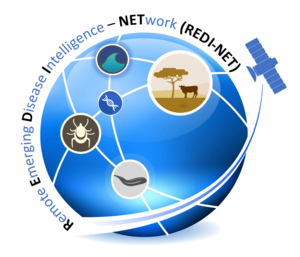Remote Emerging Disease Intelligence NETwork (REDI-NET)

The overarching aim of the Remote Emerging Disease Intelligence NETwork (REDI-NET) is to develop a collaborative network among domestic and international partnering institutions to address surveillance needs to effectively DETECT, PREDICT and CONTAIN potentially emergent zoonosis of human relevance and improve the accuracy and timeliness of the ‘data-to decision’ pipeline.
Surveillance efforts are often narrow in scope (targeting a predetermined cohort of biological samples and testing for known pathogens). Lack of capacity at the source of sampling is problematic as surveillance reports can be seriously delayed while samples are sent to overloaded reach-back laboratories, and can take weeks or months to be processed with data release occurring many months longer.
Never before has the catastrophic impact of zoonotic spillover on humans needed less introduction. With overpopulation, pressure for shared resources (land, food and water) enhances the risk of pathogen crossover from wild animals into domestic animals and humans. Extensive networks of rapid global travel coupled with todays’ densely populated megacities all contribute to the risk of, and rapid spread of, emerging infectious diseases. Epidemics of emerging and exotic nature are becoming more frequent and diverse worldwide and these outbreaks will inevitably continue into the foreseeable future.
Surveillance efforts are often narrow in scope (targeting a predetermined cohort of biological samples and testing for known pathogens). Lack of expertise at source, complexities in data release and cold-chain shipping, and serious delays at overloaded laboratories cause results to take weeks or months to be processed. To overcome these obstacles and effectively DETECT, PREDICT and CONTAIN potentially emergent zoonosis of relevance, we need to radically change our current approach to improve the accuracy, comprehensiveness, and timeliness of the ‘data-to decision’ pipeline.
To address emerging infectious disease surveillance needs, the REDI-NET addresses the absence of scalable data and metadata management approaches that utilize distributed computing capabilities that have revolutionized scientific advances in other fields.
The REDI-NET consortium will develop a flexible, scalable, and expandable computing substrate - ‘a system of systems’ - upon which a myriad of global health computing platforms can be developed and customized to support specific modeling, prediction and policy decisions in support of public health. The REDI-NET will focus on enhanced surveillance approaches to characterize naturally occurring pathogens in temperate, tropical forest, and tropical grassland sites. With funding from the Department of Defense, the University of Notre Dame is implementing this project in partnership with Belize Vector and Ecology Center (BVEC), Navy Medical Research Center (NMRC), Navy Entomology Center of Excellence (NECE), Walter Reed Biosystematics Unit (WRBU), Smithsonian Institute, Mpala Research Centre and VecTech.
Click here for more information